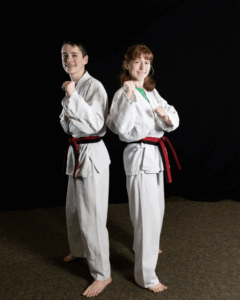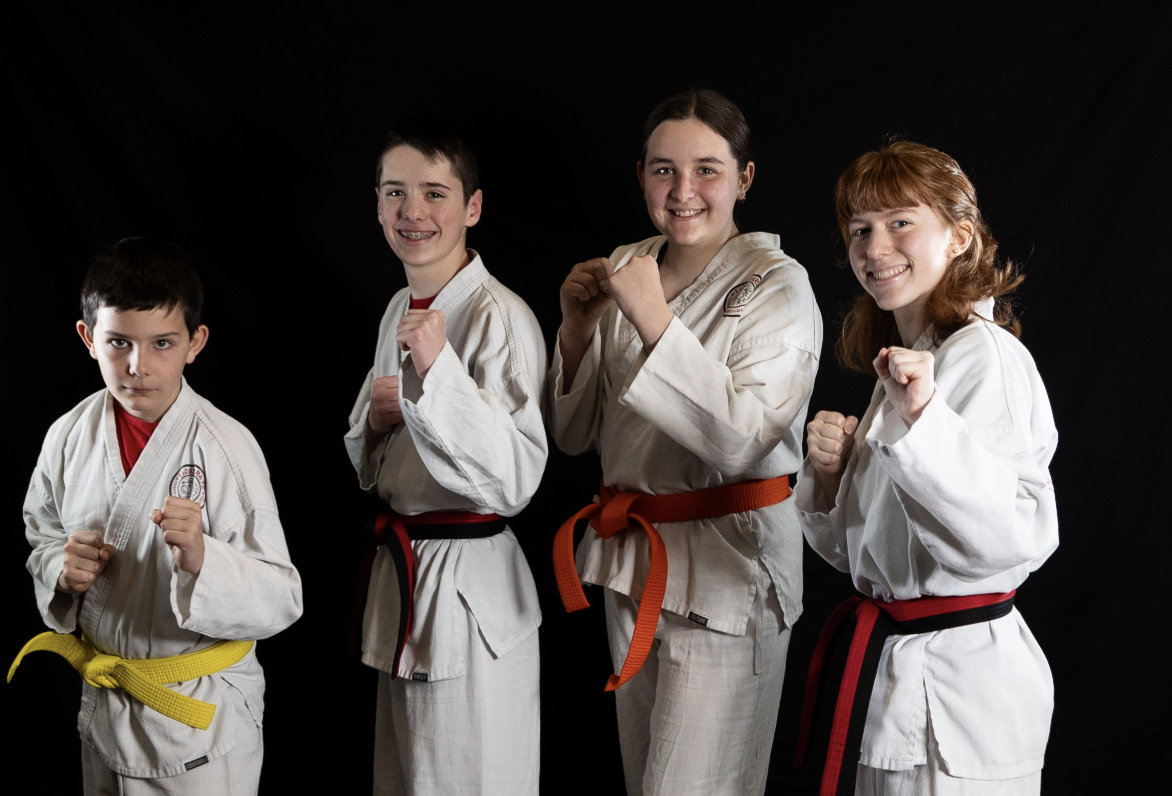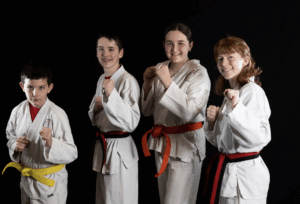 When Steve Hanford was 7 years old, his mother signed him up for a martial arts program at the local youth center in Syracuse. As a stay-at-home mom determined to keep her children active, she enrolled him in almost every sport and activity available — basketball, baseball, soccer, skateboarding, chess and more. While he enjoyed many of them, martial arts quickly became his favorite.
When Steve Hanford was 7 years old, his mother signed him up for a martial arts program at the local youth center in Syracuse. As a stay-at-home mom determined to keep her children active, she enrolled him in almost every sport and activity available — basketball, baseball, soccer, skateboarding, chess and more. While he enjoyed many of them, martial arts quickly became his favorite.
“I had an older sister who was much bigger than me, and she beat me up a lot,” Hanford says with a laugh. “I wanted to be able to defend myself when I needed to, to feel like I wasn’t powerless.”
Karate gave him that sense of empowerment. At the same time, he realized something else — unlike other sports, he wouldn’t be compared side by side with teammates or have to wait for playing time. Even when he was good, whether he played or sat on the bench depended on how much his abilities could contribute to the team’s chances of winning. In karate, his growth depended entirely on his own dedication.
“When I started karate, it just clicked,” he says. “I liked that it was up to me and my effort. If I practiced hard, I got to test. If I didn’t, I didn’t.”
Testing was what hooked him.
“You show your forms, your techniques, your discipline, and then you move forward,” he says. “Nobody else can do it for you. It’s not about how many minutes you get on the court. It’s about what you’ve put in yourself.”
That direct link between responsibility and achievement shaped his respect for martial arts and the standards he has carried ever since. Over time, that foundation led him to see teaching as a calling, and eventually, the opportunity to lead a school of his own.
Hanford trained under instructor Ken Gillenwater, who opened Lions Karate in 1986. Over the years, he earned multiple black belts – 7th degree in Taekwondo, 5th degree in Kobudo, and 3rd degree in Aiki Jutsu. By the age of 29, he was teaching full-time. When Gillenwater was diagnosed with ALS, he entrusted the school to Hanford.
“He said, ‘You want to live out your childhood dream and take over?’” Hanford recalls. “It came to fruition, but in a sad way. From that moment, I knew I wanted to honor him in everything I did with the school.”
Today, Hanford leads Lions Karate with respect for tradition and an eye toward growth.
 “If Mr. Gillenwater walked into a black belt test today, he would recognize everything he taught,” Hanford says. “We’ve added a few things, but the core curriculum has never changed.”
“If Mr. Gillenwater walked into a black belt test today, he would recognize everything he taught,” Hanford says. “We’ve added a few things, but the core curriculum has never changed.”
He smiles as he remembers the early days, when plaid wallpaper covered the walls and buckets caught rainwater from the ceiling.
“My instructor used to say, ‘If you spend money to redo the ceiling, is that going to bring in new students?’ He wouldn’t even use the air conditioner. I’ve updated the school, but the foundation — the values, the discipline, the way we teach — has stayed the same.”
At Lions Karate, students train in three arts. Taekwondo focuses on kicking and punching. Kobudo teaches traditional weapons such as the bo staff, nunchaku, and sword. Aiki Jutsu covers joint locks and throws, but is reserved for teens and adults for safety reasons. Hanford often combines Taekwondo and Kobudo in classes, while Aiki Jutsu maintains its own schedule.
Students begin as early as age 3 in “Little Lions,” which emphasizes balance, coordination and focus. Structured training starts at 5, with classes divided by age and skill level. Hanford teaches everyone — from children to seniors in their 70s. One longtime student credits karate with helping reduce his chiropractor visits from three times a week to none. Another joked that without class, she would “just be a couch potato,” but the fitness built into every lesson keeps her moving.
Discipline is central, but Hanford’s approach balances accountability with encouragement.
“Sometimes we take a belt away and hang it on the wall,” he says. “Every class sees it, and we say whose belt it is and why. It’s a reminder — don’t be like Timmy. He lost his belt for fighting in school or for bad grades.”
Hanford clarifies that by “fighting in school,” he means starting fights or reacting impulsively, which goes against everything karate teaches.
On the other hand, standing up for yourself in the right way is different.
“Self-defense is taught as a last resort, when no other choice is available,” Hanford says.
 Students learn first to stay calm, speak up, and walk away if they can. But if a bully refuses to back down and there is no other option, to me, defending yourself is the right choice. Students who handle those moments with courage may even find a Dairy Queen coupon tucked into their hand.
Students learn first to stay calm, speak up, and walk away if they can. But if a bully refuses to back down and there is no other option, to me, defending yourself is the right choice. Students who handle those moments with courage may even find a Dairy Queen coupon tucked into their hand.
“Suspension from school is never the goal and can carry real consequences,” Hanford acknowledges. “But if a student is disciplined for defending themselves appropriately, they deserve a little ice cream. It shows courage and initiative.”
Parents notice the difference. Kristin Jean shares, “My son’s confidence and self-discipline continue to grow through the principles and hard work taught at Lions Karate. He loves the challenges of his karate forms and the fun experiences, such as karate camp.”
Community is just as important as discipline. Lions Karate hosts tournaments, summer camps, and an annual Christmas party where every child takes home a trophy. Two barbecues each summer raise funds for student outings. This year, Hanford rented an entire water park in Columbia City for 117 students and their families.
“We paid for everyone— siblings, parents, all of them. It’s about giving back,” he says.
The school also organizes roller skating nights, laser tag trips and a golf outing that funds prizes and events.
Women’s self-defense classes are another way Hanford extends his teaching. He offers free sessions three times a year at the local library and holds seminars for businesses, schools and churches.
“Women need to know self-defense, even if it’s just the basics,” he says. “I hope they never have to use it, but confidence makes all the difference.”
His teaching extends to special needs students as well. Hanford has worked with special needs adults in Fort Wayne for years and guided autistic students to advanced ranks.
“It’s about patience and meeting individual needs,” he says.
Supporting him is a dedicated team that includes longtime assistant Joe Robinson and instructor Denyel Bond, who runs classes in Columbia City and co-leads homeschool programs. Junior Black Belts are also mentored into leadership roles.
“Some are natural teachers, others are role models,” Hanford says. “We give them opportunities to lead, and it builds skills they’ll carry into life.”
For Hanford, the true reward is in the transformation.
“When students realize it’s not just a hobby anymore and it starts to become a lifestyle – that’s the lightbulb moment,” he says.
Candy Colbert agrees.
“Lions Karate has continually provided excellent and consistent instruction for my daughter throughout the last eight years,” Colbert says. “I appreciate Mr. Hanford’s investment in her training and understanding of her all-around well-being.”
Looking ahead, Hanford envisions adding locations in Warsaw or North Manchester while raising his own two sons with his wife, Kathleen. His 9-year-old, Trevor, trains regularly, while his 5-year-old, Carson, is still deciding between karate and other sports.
“We just want him to find something he loves and is passionate about,” Hanford says.
From the youngest Little Lions to the most advanced Black Belts, Lions Karate is more than a martial arts school. It is a place where students find confidence, discipline, and community — and lessons that extend far beyond the mat. For Hanford, it is the continuation of a love for karate that began when he was a 7-year-old stepping onto the mat for the very first time.
Lions Karate is located at 126 S. Main St. in North Webster. For more information, call 574-527-5765 or email Steve@lionskarate.com.










